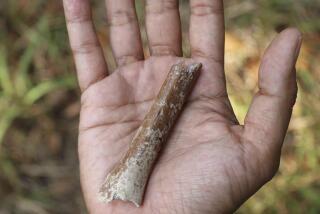Skull Found on Java Is ‘Kind of a Missing Link’
- Share via
A new Homo erectus skull found on the island of Java indicates that the human ancestor called “Java man” lived on the island for nearly 1 million years, isolated from other Asian populations. The skull was fished from the bottom of the Solo River in Sambungmacan in central Java, and thus cannot be dated from surrounding sediments, but its features suggest that it is probably 750,000 to 1 million years old.
The first H. erectus skull was found on Java in 1891, and many others have been identified since. Most have been identified as either fairly primitive forms, dating back as far as 1.5 million years, or more modern forms, only about 400,000 years old.
The new skull, reported in Friday’s issue of Science, has features indicating that it is intermediate between the two extremes. Anthropologist Hisao Baba of the University of Tokyo calls it “a kind of a missing link.”
The fact that scientists are now able to show a gradual progression of characteristics in H. erectus skulls from Java indicates that the evolution of the hominids occurred on the island. Some scientists had suggested that the early and late forms arose from two migrations to the isolated region.
More to Read
Sign up for Essential California
The most important California stories and recommendations in your inbox every morning.
You may occasionally receive promotional content from the Los Angeles Times.












